- City Fajr Shuruq Duhr Asr Magrib Isha
- Dubai 04:33 05:50 12:21 15:48 18:46 20:03
Staff at a Moscow airport scrambled fire crews one minute after a malfunctioning passenger jet crash-landed on Sunday, raising questions among some senior Russian aviation industry figures about whether the staff acted quickly enough.
The speed of the response to the emergency, in which 41 people were killed in an intense blaze, has come into focus because the aircraft, which had signalled technical problems prior to landing, stood on the runway for just under two minutes before the first fire truck started tackling the flames.
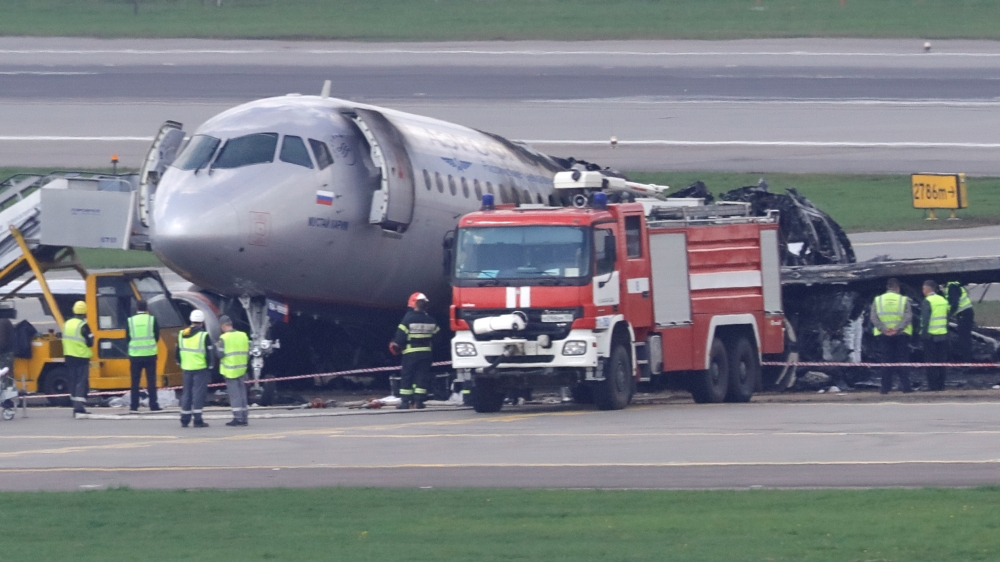
Photo: Reuters
Alexander Zhuravkov, head of the committee for emergency situations of Russian airport industry association "Aeroport", said fire crews arrived within the maximum time after the alert was raised, as set out in domestic regulations and international standards.
"The question, though, is why the alert was raised after the landing, and not before, in a timely fashion, since there was an expected landing underway of an aircraft with an emergency situation on board," Zhuravkov told Reuters.
According to a timeline of the incident released late on Tuesday by Moscow's Sheremetyevo airport, staff on the ground knew minutes before the landing that the plane's main radio communication system and autopilot were knocked out.
According to flight-tracking service flightradar24.com, the plane had also issued a distress signal prior to landing denoting an emergency.
Under airport rules, those warnings do not automatically trigger mobilisation of fire crews.
Asked why fire crews were not scrambled earlier, a spokesman for Sheremetyevo declined to comment beyond the timeline. Russia's transport ministry and the plane's operator, Aeroflot, declined to comment.
The Investigative Committee, the state body investigating the crash, did not immediately respond to a request for comment.
Ilona Borisova, head of the Sheremetyevo branch of the flight attendants' trade union, said that the evidence available to staff on the ground before the landing, taken together, should have prompted pre-emptive action.
"I'm worried that they did not take a holistic approach to the issue," said Borisova, referring to how officials on the ground interpreted the distress signals from the plane.
"If potentially someone is in a tricky situation and there is no communication with him...That means probably that logic dictates you need to undertake some kind of pre-emptive measures," she added. Borisova said that meant fire crews being positioned to wait for the plane to land.
Russia probes pilot error after deadly plane blaze
Russian investigators were on Tuesday considering pilot error as the cause of a crash-landing that saw a plane erupt in flames at Moscow's busiest airport and kill 41 people, media reported.
The Sukhoi Superjet-100 had just flown out of Sheremetyevo airport on Sunday evening when it sent out an emergency signal and circled back, bouncing on the runway and catching fire.
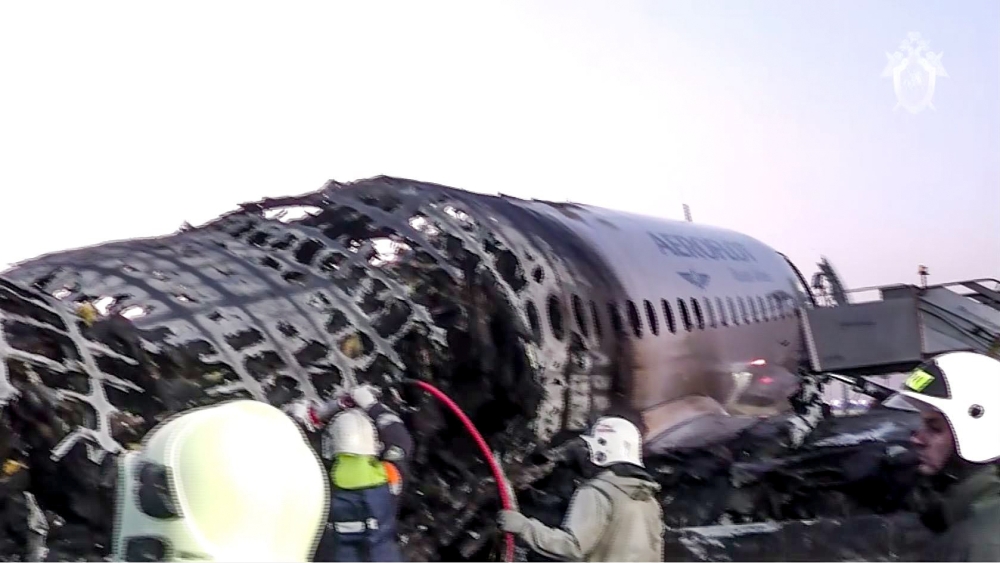
Sources in the investigation told Kommersant newspaper the Aeroflot pilots made a number of errors including flying into a thunderstorm and landing with a full tank rather than circling to use up fuel.
Various sources told the business daily RBK the pilots opened a cockpit window, potentially fanning the flames, and failed to turn off engines immediately after landing.
Investigators are still examining the black boxes from the plane and have so far given no official reason for the crash.
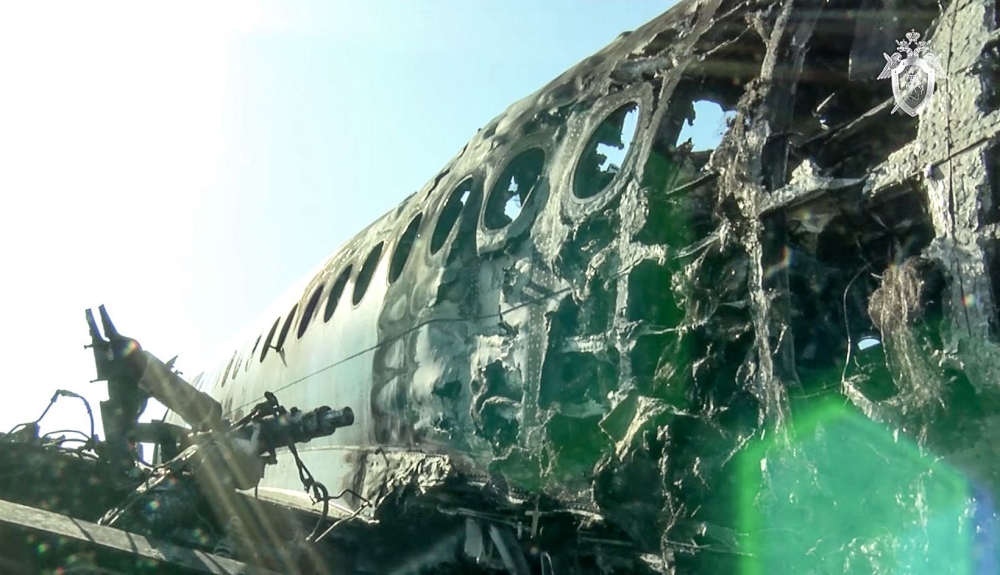
Pilot Denis Yevdokimov earlier said the lightning strike shortly after take-off caused the aircraft to lose communication and forced the emergency landing.
Passengers and crew said they saw a bright light and felt a jolt as the plane entered clouds.
Videos on social media showed the plane landing with a jolt and then speeding along the runway with flames pouring from its fuselage.
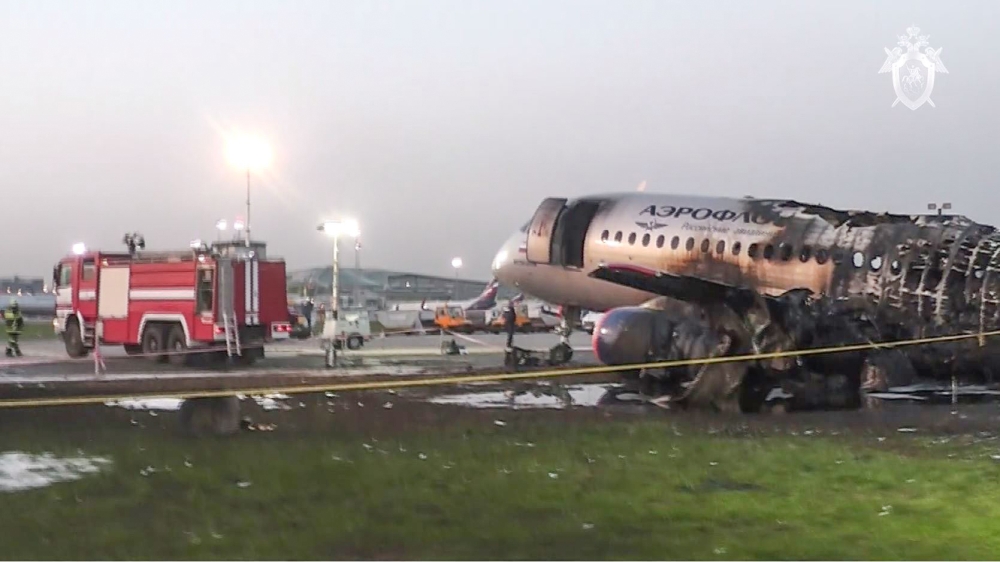
People could be seen leaping onto an inflatable slide at the front and running from the blazing plane as columns of black smoke billowed into the sky.
In the footage, several passengers were carrying hand luggage, prompting harsh online criticism.
Some on social media suggested that taking the bags out of lockers could have held up the evacuation of the plane, though no witness accounts confirmed the speculation.
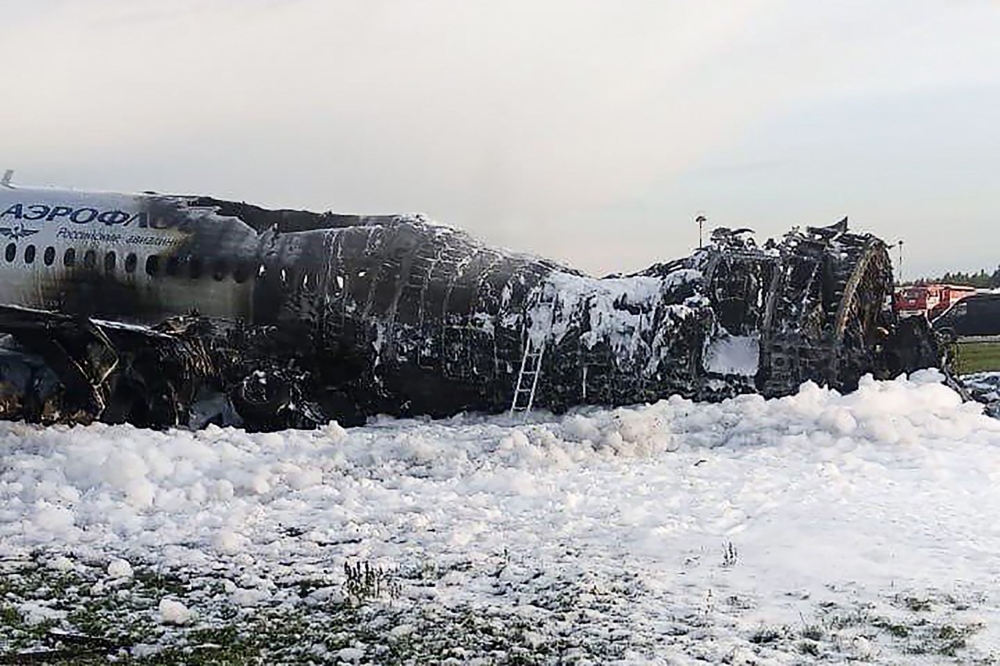
Survivor Oleg Molchanov, who posted a photo of his boarding pass to prove his identity, wrote on an online forum that toxic black smoke filling the cabin within seconds was the reason evacuation from the back rows was extremely difficult.
Meanwhile a video also emerged showing unidentified officials at the airport laughing as they shot footage of the fatal landing.
Sheremetyevo said in a statement that the officials - who were not employees of the airport company or Aeroflot - would be "punished in the strictest possible way".
Ten passengers were hospitalised following the crash, and all were in a stable condition Tuesday, transport minister Yevgeny Dietrich said.
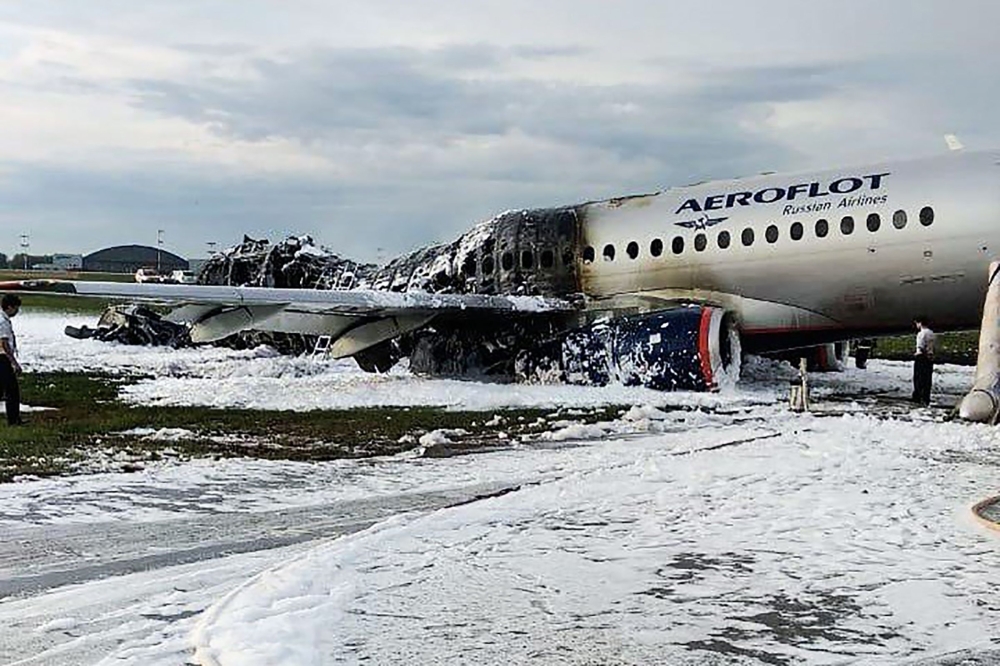
Photos: AFP
Russia's national carrier Aeroflot was once notorious for a poor safety record but in recent years its image has improved and it has not had a fatal accident in more than a decade.
The Russian Sukhoi Superjet-100 however has been dogged with problems since its launch in 2011 and Russia has struggled to convince foreign carriers to purchase it.
In 2012, a Superjet performing at an Indonesian air show slammed into a volcano, killing all 45 people on board. Indonesia blamed the crash on pilot error.
Dietrich said there were no plans to ground the Superjet-100 model.
Plane was heavy with extra fuel before deadly crash landing
A Russian airliner that took off from Moscow was airborne for just 28 minutes before returning to make an emergency landing while still heavy with unburned fuel, which then ignited after a rough touchdown.
Flames quickly engulfed the aircraft, killing 41 of the 78 people aboard.
A day after Sunday's horrifying accident at Sheremetyevo airport, Russian news media quoted the pilot, Denis Evdokimov, as saying he followed procedures for landing with excess weight. But the crew reportedly did not dump any fuel, which is common for flights that have to land soon after takeoff to prevent being overly heavy.
The pilot said he was not certain why the plane landed hard. Video showed flames bursting from the jet's underside as it touched down, then raging across the rear of the Sukhoi SSJ100's fuselage within seconds as the airliner bounced down the runway.
"Everything happened right away, at lightning speed. There was a strong blow - my eyes almost popped out - a second was a little quieter, a third, and then smoke, and it started to burn immediately," survivor Marina Sitnikova was quoted as telling the magazine Snob.
When the plane came to a halt, some of the people aboard plunged down inflatable slides deployed from the forward part of the plane.
Some of those who escaped were carrying luggage, raising concerns that grabbing their bags may have delayed an evacuation in which every second was critical.
"I do not know what to say about people who ran out with bags. God is their judge," survivor Mikhail Savchenko wrote on Facebook.
Evdokimov said the plane had lost radio communications because of a lightning strike, but it was not clear if that precipitated the emergency landing.
A flight attendant said there was a sharp flash soon after the Aeroflot flight took off, bound for the northern city of Murmansk.
"We took off, got into a cloud, there was strong hail, and at that moment there was a pop and some kind of flash, like electricity," flight attendant Tatiana Kasatnika said in a video posted on YouTube.
Russia's main investigative agency said both of the plane's flight recorders - data and voice -were recovered from the charred wreckage. Agency spokeswoman Svetlana Petrenko was also quoted by Russian news agencies on Monday as saying that investigators were looking into three main possibilities behind the cause of the disaster: inexperienced pilots, equipment failure and bad weather.
Storms were passing through the Moscow area when the plane landed.
One survivor praised the plane's attendants for helping save him and others.
"It was dark and there was gas, very high temperature. They helped people out of there, helped them to descend," Dmity Khlebnikov said, according to Komsomolskaya Pravda.
The SSJ100, also known as the Superjet, was heralded when it went into service in 2011 as a new phase for Russia's civil aviation industry. It was introduced as a replacement for outdated Soviet-designed aircraft.
But the plane has been troubled by concerns about defects in the horizontal stabilizers. Russia's aviation authority in 2017 ordered inspection of all Superjets in the country because of the problems. A Mexican airline, Interjet, grounded Superjets in December 2016 and later said it was phasing them out of the fleet.
Transportation Minister Yevegny Dietrich said Monday that it was too early to decide whether to ground the planes in Russia, and Kremlin spokesman Dmitry Peskov said the decision was not within President Vladimir Putin's power.
One of the dead was flight attendant Maxim Moiseev, Dietrich said. Russian news reports, citing unnamed sources, said the Moiseev was in the fire-stricken back part of the plane and tried unsuccessfully to deploy an evacuation slide. The dead passengers included a recent college graduate from Santa Fe, New Mexico, was on his way to serve as a fishing guide in northwest Russia.
41 dead in Russian plane blaze disaster
Forty-one people including at least two children have died after a Russian passenger plane made an emergency landing and erupted in a huge ball of fire and black smoke at Moscow's busiest airport on Sunday, investigators said.
Dramatic footage that went viral on social media showed Aeroflot's Sukhoi Superjet 100 aircraft crash-landing and then speeding along the runway at Sheremetyevo international airport, flames pouring from its fuselage.
Passengers could be seen leaping onto an inflatable slide at the front and running from the blazing plane as huge black columns of smoke billowed into the sky.
"There were 78 people including crew members on board the plane," the Investigative Committee said in a statement, adding that the plane had been flying to the northwestern Russian city of Murmansk.
"According to the updated info which the investigation has as of now, 37 people survived."
A spokeswoman for the investigators confirmed the death toll was 41.
Another 11 people were injured, Dmitry Matveyev, the Moscow region's health minister said earlier in the day.
'Horror before our eyes'
Witness Alyona Osokina said she was inside the terminal when she suddenly saw a plane on fire rushing along the runway.
"The blaze was devouring the plane," she told Rain TV.
Osokina said that fire engines had arrived quickly but could not immediately put out the blaze.
"This horror and tragedy happened before our eyes," she said, adding that those who managed to flee the plane then walked calmly towards the airport.
"I believe they were in a state of deep shock."
The jet carrying 73 passengers and five crew members had just left Sheremetyevo when the crew issued a distress signal, officials said.
"Flight Su-1492 took off on schedule at 6:02 pm (1502 GMT)," said a statement from the airport.
"After the take-off, the crew reported an anomaly and decided to come back to the departure airport. At 6:30 pm, the aircraft made an emergency landing," it added.
Russia's flagship carrier said the plane had to return to the airport "due to a technical reason" and its engines caught fire upon landing.
Previous reports had said the fire broke out in mid-air.
The jet reportedly managed to land on its second attempt, hitting the ground with its landing gear first and then its nose.
The plane's fuel tanks were full and a much bigger death toll could have been a real possibility, aviation experts said.
Investigators said they were looking into various lines of inquiry and it was premature to draw any conclusions about the cause of the accident.
Russian President Vladimir Putin had offered his condolences to the victims' loved ones, the Kremlin said.
He has also said the investigation "should be as thorough as possible," the Kremlin added.
Prime Minister Dmitry Medvedev ordered a special committee to investigate the disaster.
The Murmansk region - where many of the casualties are believed to be from - will go into a three-day period of mourning beginning Monday.
Some flights have been diverted to other Moscow airports or Nizhny Novgorod, some 400 kilometres (250 miles) east of the Russian capital.
Numerous Aeroflot flights are expected to be affected in the coming days.
Blow to aviation industry
The country's aviation's safety record has been chequered and the latest disaster is seen as a huge blow to its already struggling aviation industry.
The Sukhoi Superjet-100 was the first civilian aircraft developed in the country's post-Soviet era.
At the time of its launch, in 2011, it was a source of national pride and seen as one of Putin's pet projects.
But numerous technical problems with the plane have been reported in recent years and Russia has struggled to convince foreign carriers to purchase it.
The government offered subsidies to encourage Russian airlines to buy the Superjet and Aeroflot has became its main operator.
In September 2018, it announced a record order of 100 Superjet-100s.
After the tragedy some suggested that Russia may be better off abandoning the Sukhoi Superjet altogether.
![]() Follow Emirates 24|7 on Google News.
Follow Emirates 24|7 on Google News.